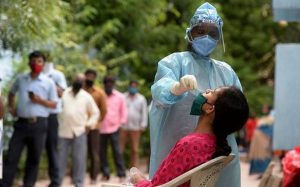Table of Contents

The head of the country’s main health agency responding to coronaviruses, Drs Balaram Bhargava head of ICMR has said that districts reporting a high number of infections should remain closed for the next six to eight weeks to control the spread of the pervasive disease.
The head of the Indian Council of Medical Research (ICMR), Drs. Bhargava said in an interview that the lockdown ban should apply in all districts where the infection rate is above 10% of those tested. Currently, three-quarters of India’s 718 districts are known to have test-positivity rates greater than 10%, including major cities such as New Delhi, Mumbai, and Bengaluru’s tech hubs.
Also, read | Maharashtra scientist stem-cell remedy kills COVID-19 naturally
What did Drs Balaram Bhargava say?
- Bhargava’s remarks are the first time a senior government official has outlined how long the lockdown that surrounds large parts of the country needs to curb the crisis in India.
- The Narendra Modi government has shunned the nationwide lockdown due to economic impact and left it to the state governments.
- Many states have introduced various levels of restrictions on economic activity and public movement to prevent the spread of the virus, which are being reviewed mostly on a weekly or fortnightly basis.
- Bhargava said Districts with high positivity should remain (closed). If they fall from 10% (positivity rate) to 5%, then we can open them, but it should happen.
- That will happen in six, eight weeks.” Will be done.” Said in an interview at the New Delhi headquarters of the country’s top medical research body ICMR.
Citing the capital, one of the toughest cities in India, where the positivity rate had reached around 35%, but now has fallen to around 17%, Bhargava said, “If Delhi is opened tomorrow, It will be a disaster.
With the current wave of COVID-19 infections, the country is in serious distress in about 350,000 cases and 4,000 deaths per day. Hospitals and morgues are overflowing, medical staff is exhausted and oxygen and medicines are running low.
Many experts say that the actual case is long and deaths can be as high as five to 10 times. PM Modi and other top political leaders have faced a public backlash to address mass election rallies where no major COVID-19 security protocols were followed.
What did Drs Balaram Bhargava say about Modi Government management?
- Bhargava did not criticize the Modi government but admitted that there was a delay in responding to the crisis.
- I think the only dissatisfaction we had was a slight delay in accepting the 10% (recommendation), but it did.
- He said that the April 15 meeting of the National Task Force on COVID-19 had recommended to the government to close the areas with a 10% positivity rate or more.
- Yet, in a televised speech on April 20, PM Modi dissuaded states and said a lockdown should be used as a “last resort” and the focus should remain on “micro containment zones”.
- On April 26 – more than 10 days after the task force meeting – the home ministry wrote to states, asking them to implement strict measures for “large containment areas” in hard-hit districts, but only for 14 days.
Drs. Bhargava on Political and religious rallies
- Earlier this month, Reuters reported that the head of the National Center for Disease Control had privately told an online gathering that strict lockdown measures were needed in early April.
- Two senior ICMR officials told Reuters that the organization was frustrated about allowing political leaders to address large rallies and allow religious ceremonies, saying the action publicly sparked necessary security measures.
- Modi himself addressed several political gatherings, unmasked.
- Our message is completely wrong, not keeping pace with the situation, “one of the officials said referring to the government. We have failed miserably.”
Bhargava denied that there was any dissatisfaction within the ICMR and the agency was linked on the same page with the policymakers. Without directly commenting on political leaders, he said that mass celebrations during COVID-19 should not be acceptable in India or elsewhere. It’s common-sense he said.
For daily news updates related to finance, business and sports keep following our portal Daily News Capsule

Nikita Dhyani is a passionate writer. She basically writes on Health, Finance, and Politics related topics. She has explored many areas of interest and is being a part of the journalism industry.
